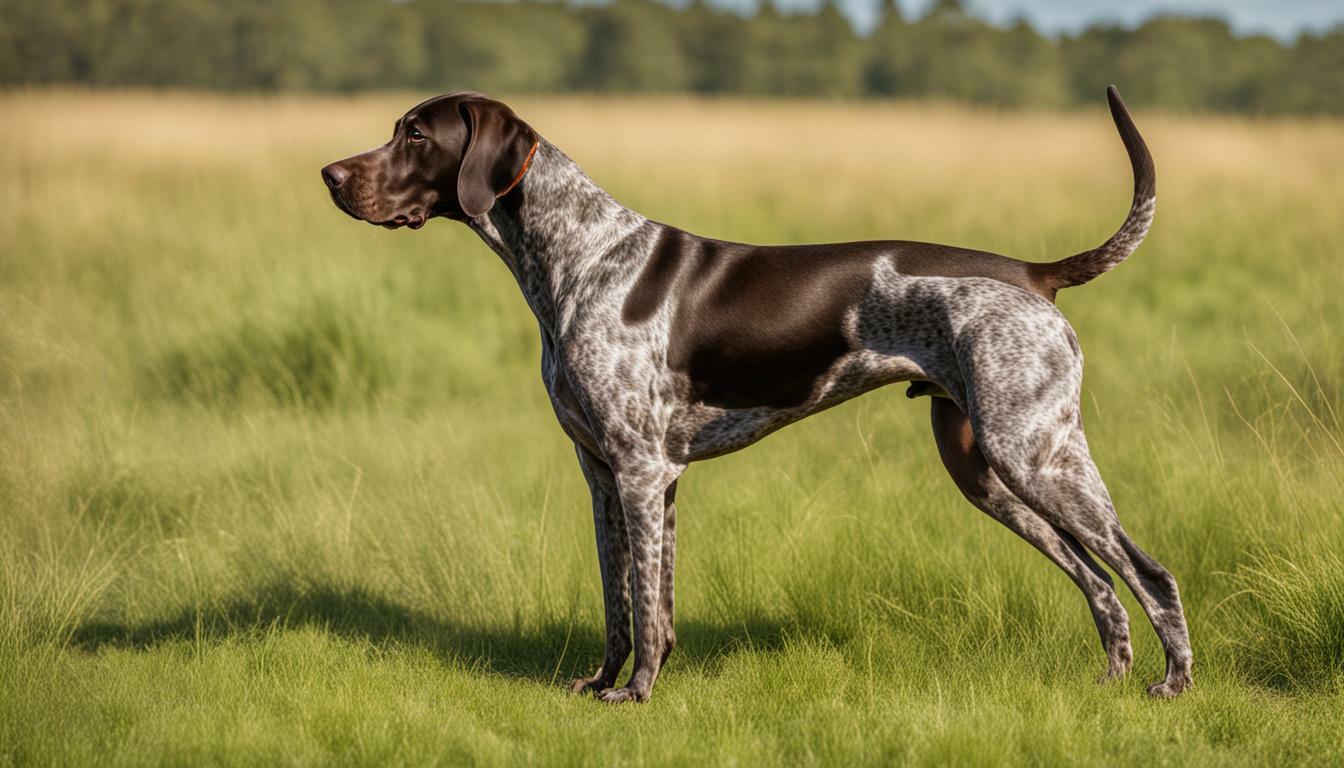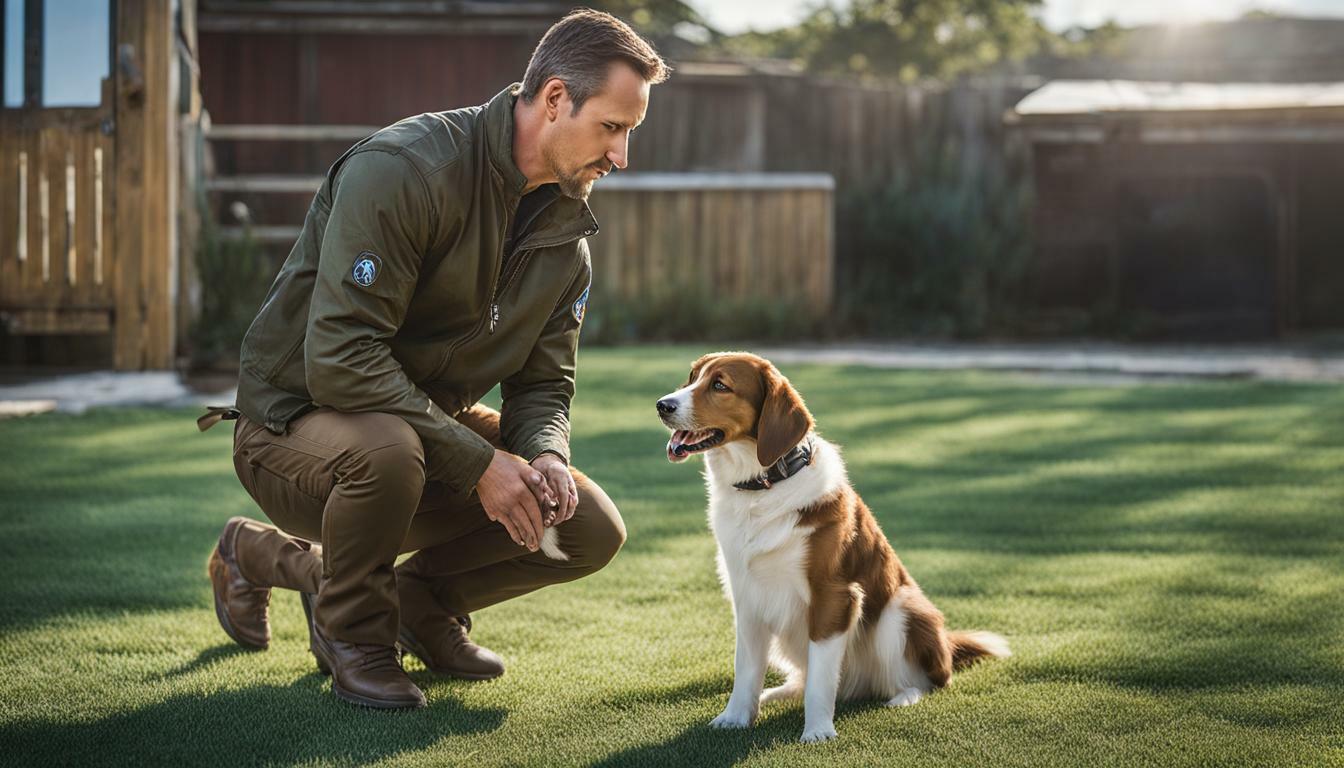If you are considering adding a German Shorthaired Pointer (GSP) to your family, it’s important to understand that they are an energetic breed with unique needs. As a new GSP owner, you may have questions about raising, training, and caring for your furry friend. That’s why we’ve put together this comprehensive German Shorthaired Pointer ownership guide.
Here, you’ll find valuable tips and advice on how to ensure a happy and healthy relationship with your GSP. From getting to know the breed’s characteristics to choosing a reputable breeder, bringing your GSP home, raising a GSP puppy, and meeting their exercise and nutrition needs, this guide covers it all.
By following the guidance provided in this German Shorthaired Pointer ownership guide, you’ll be well-equipped to provide your furry friend with the care and attention they need to thrive.
- The German Shorthaired Pointer is an energetic breed that requires proper care and attention.
- Choosing a reputable breeder is crucial for ensuring a healthy and well-bred GSP.
- Proper training and socialization are essential for raising a well-behaved and happy GSP.
- GSPs require plenty of exercise to thrive physically and mentally.
- Providing a well-balanced and nutritious diet is crucial for the health and longevity of your GSP.
Getting to Know the German Shorthaired Pointer
Before deciding to bring a German Shorthaired Pointer (GSP) into your home, it’s important to learn about the breed’s characteristics, temperament, and history. GSPs are a versatile breed known for their intelligence, athleticism, and loyalty. Originally bred in Germany in the 19th century as hunting dogs, today, they make great family pets and excel in various canine activities such as obedience, agility, and tracking.
GSPs are medium-sized dogs with short, sleek coats that can come in several colors, including liver, black, and white. They have a strong and muscular build that gives them the stamina and endurance they need for outdoor activities. Their average lifespan is between 12 to 14 years.
One of the most notable traits of GSPs is their energetic and outgoing nature. They are highly social dogs that thrive on human interaction and require plenty of exercise and mental stimulation to stay happy and healthy. As such, they are not the ideal breed for apartment living or for owners who cannot provide them with ample exercise and playtime.
GSPs have an intelligent and trainable temperament. They are eager to please their owners and respond well to positive reinforcement training methods. However, as hunting dogs, they have a strong prey drive and may require extra training and socialization to coexist peacefully with smaller animals such as cats and rabbits.
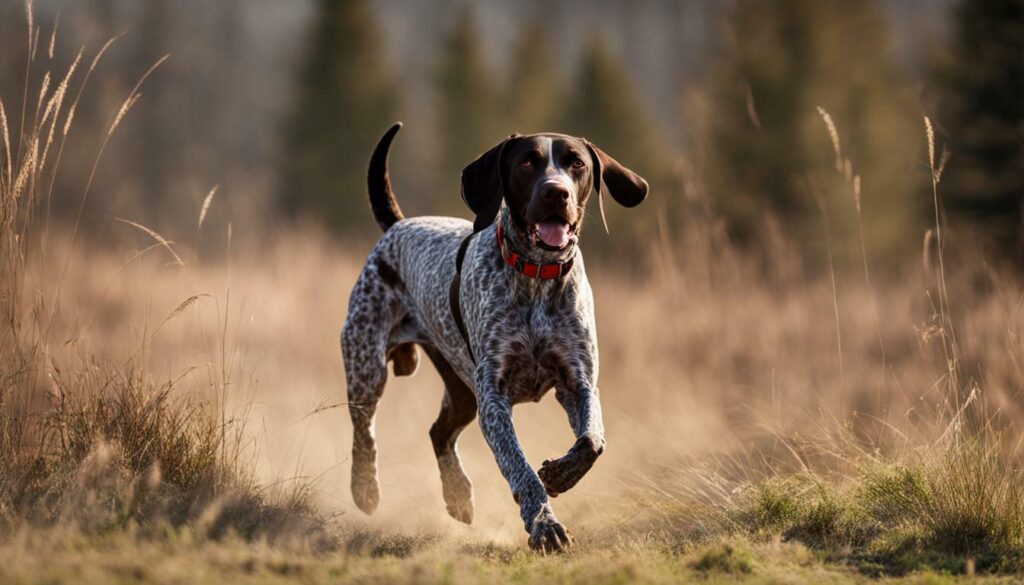
Overall, GSPs are loyal, loving, and energetic dogs that make great companions for active families. However, it’s crucial to understand their characteristics, temperament, and history before bringing one home to ensure a happy and healthy relationship with your furry friend.
Choosing the Right German Shorthaired Pointer Breeder
Choosing the right breeder is crucial when adding a new German Shorthaired Pointer to your family. A reputable breeder will ensure that your GSP is healthy, well-bred, and has a good temperament. It’s important to do your research and identify breeders who practice responsible breeding practices.
One way to find a reputable breeder is to contact the German Shorthaired Pointer Club of America (GSPCA). They can provide a list of breeders who follow the club’s Code of Ethics and meet certain standards for responsible breeding.
When you’ve found a potential breeder, ask questions about their breeding program, such as:
- What health tests do they perform on their dogs?
- What is their breeding philosophy?
- How do they socialize their puppies?
- Can they provide references from previous puppy buyers?
Visit the breeder in person and observe the conditions in which the dogs and puppies are kept. This will give you an idea of how well they are cared for and how the breeder operates.
Remember that a responsible breeder will also ask you questions about your lifestyle, experience with dogs, and why you want a GSP. They want to ensure that their puppies are going to good homes and that the new owners are prepared for the responsibilities of GSP ownership.
Choosing the right breeder is key to giving your German Shorthaired Pointer a healthy and happy start in life. By doing your research and asking the right questions, you can find a reputable breeder who will help you find the perfect GSP for your family.
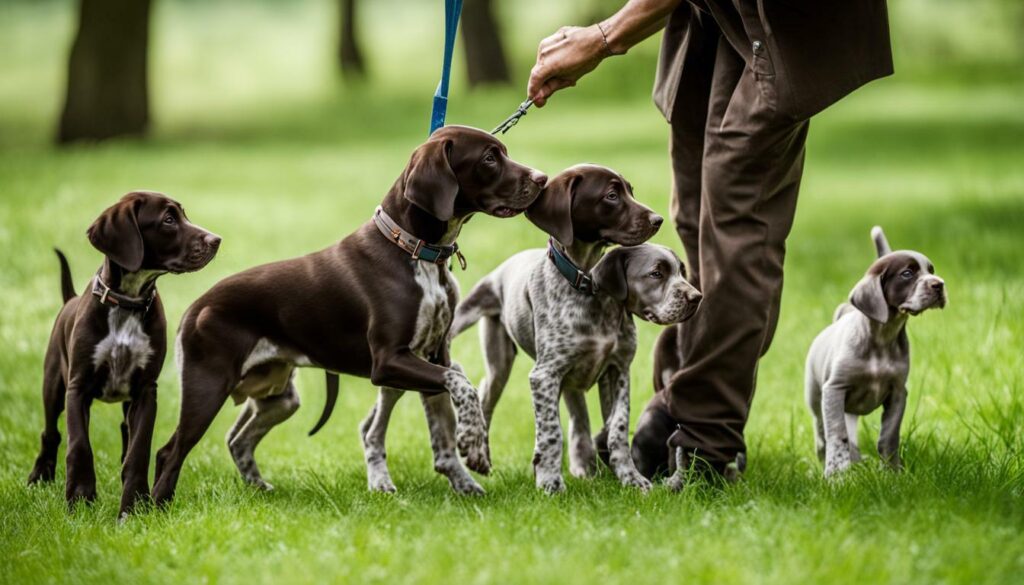
Bringing a new German Shorthaired Pointer puppy home is an exciting time, but it requires careful preparation to ensure that your furry friend feels safe, comfortable, and loved. Before you bring your GSP home, make sure to prepare your living space for the new addition to your family. This includes arranging a comfortable sleeping area for your puppy, as well as selecting appropriate GSP supplies.
Creating a designated sleeping area for your GSP is essential. While some owners opt for crate training, others may prefer to designate a specific room or area in the house for their puppy. Regardless of your preferred method, make sure your pup has a cozy bed, toys, and a clean water source.
To prepare for your new GSP, you may need to invest in certain supplies. These can include a high-quality dog food and water bowls, toys, a leash, and a collar with identification tags. Additionally, you may want to purchase a dog crate or pen for your puppy to use while they get accustomed to their new surroundings. Don’t forget to puppy-proof your home by securing any areas that could be hazardous to your furry friend.

During the first few weeks, it is important to create a routine for your GSP puppy. This routine should include feeding times, exercise, playtime, and potty breaks. Stick to a consistent schedule to help your pup feel secure and establish good habits.
Finally, be patient as your GSP puppy adjusts to their new home. It’s natural to experience some challenges during the transition period, but with proper care, attention, and love, you can help your furry friend adapt to their new surroundings with ease.
Raising a German Shorthaired Pointer Puppy
German Shorthaired Pointer puppies are full of energy and require special care and attention. Proper puppy care and training are crucial for laying the foundation for a well-behaved and happy adult GSP. Here are some essential tips for raising your German Shorthaired Pointer puppy:
GSP Puppy Care
Starting off on the right foot with GSP puppy care is essential. This includes providing a comfortable sleeping area, taking your puppy to the vet for regular check-ups and vaccinations, and feeding them a healthy and balanced diet. GSP puppies also require plenty of exercise and playtime to burn off their energy and prevent destructive behavior.
It’s important to establish a consistent routine for your puppy, including meal times, potty breaks, and playtime. This will help them feel secure and develop good habits as they grow.
GSP Puppy Training
Proper training is crucial for a well-behaved GSP. Start with basic obedience training, such as teaching your puppy to sit, stay, and come when called. Positive reinforcement techniques, such as rewards and praise, are effective for GSP training.
It’s also important to address unwanted behaviors early on, such as jumping up or biting. Consistency and patience are key when training your GSP puppy.
Socializing a GSP Puppy
Socializing your GSP puppy is essential for developing good behavior and preventing fear and aggression towards other animals and people. Start socializing your puppy early on by introducing them to new people, other pets, and different environments.
Take your puppy on outings to pet stores, parks, and other public places to expose them to new experiences. Puppy socialization classes and playdates with other puppies can also be beneficial for your GSP’s development.
By providing proper care, training, and socialization for your German Shorthaired Pointer puppy, you can lay the foundation for a happy and well-behaved adult GSP.

German Shorthaired Pointers are highly intelligent and eager to please, making them a joy to train. However, their energy and strong-willed nature can also present a challenge for some owners. Here are some training and behavior tips to help you raise a well-behaved and happy GSP:
Obedience Training
Obedience training is crucial for any dog, but especially for a breed as active and curious as the German Shorthaired Pointer. Starting formal training at a young age is recommended, as it will help establish boundaries and encourage good behavior. Positive reinforcement techniques, such as treats and praise, are particularly effective with GSPs, as they respond well to positive feedback.
Socialization
German Shorthaired Pointers are social dogs that thrive on human interaction and enjoy being around other dogs. It is important to socialize your GSP early on to prevent shyness or aggression towards other dogs. Take your puppy to obedience classes, dog parks, and other places where they can interact with people and dogs.
Consistency
Consistency is key when training a German Shorthaired Pointer. Establish clear rules and boundaries, and stick to them. Be patient and persistent, as GSPs can be strong-willed and may test boundaries. With consistent training, your GSP will learn to respect and follow your lead.
Exercise
Regular exercise is essential for the physical and mental well-being of your German Shorthaired Pointer, and can also help with behavior issues such as destructiveness or restlessness. GSPs enjoy running, hiking, and playing, and require at least an hour of vigorous exercise daily. Make sure to provide plenty of opportunities for play and physical activity, which will also help strengthen your bond with your dog.
Positive Reinforcement
Positive reinforcement is a highly effective training method for German Shorthaired Pointers. This involves rewarding good behavior with treats, praise, or affection, rather than punishing bad behavior. GSPs respond well to positive feedback and thrive on praise, so be sure to reward good behavior consistently.
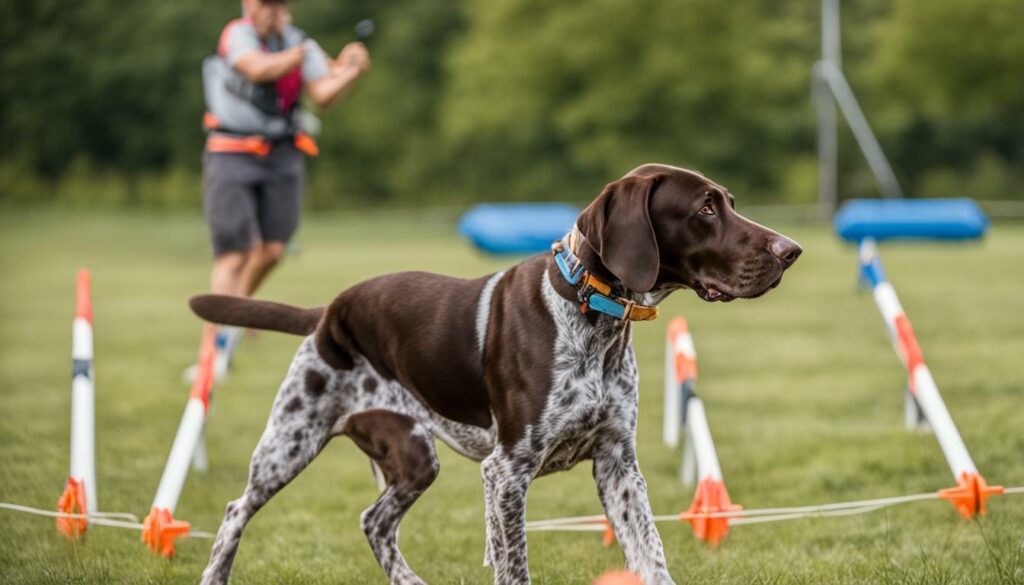
German Shorthaired Pointers are generally healthy dogs, but like all breeds, they do have specific needs when it comes to their health and wellness. Regular veterinary visits, proper vaccinations, and grooming are essential to ensure your GSP lives a happy and healthy life.
Veterinary Care
Regular veterinary care is critical to the overall health of your German Shorthaired Pointer. Annual check-ups at a trusted vet are recommended to catch any potential health issues early. Additionally, it’s important to keep your GSP up-to-date on their vaccinations, including rabies, distemper, and parvovirus.
If your GSP displays any unusual symptoms or behaviors, it’s essential to seek veterinary care immediately. Catching potential health concerns early can save time, money, and ensure your GSP remains healthy.

German Shorthaired Pointers have a short, low-maintenance coat, but regular grooming is still important to keep them clean, healthy, and looking their best. Weekly brushing can help remove loose hair and keep their coat shiny and healthy. It’s also vital to keep your GSP’s ears clean to prevent infections. Monthly nail trimming and regular teeth brushing are also essential for overall grooming and wellness.
During grooming, it’s important to check your GSP’s skin for any bumps, lumps, or irritations. Regular checking can help you detect any potential health concerns early on.
Diet and Exercise
Proper nutrition and physical activity are essential to the overall health and well-being of your German Shorthaired Pointer. Feeding a high-quality dog food with the right balance of protein, fat, and carbohydrates is essential for their health and energy levels.
Additionally, GSPs are an active and energetic breed that requires plenty of exercise to stay healthy. Regular walks, runs, and playtime are vital to keep them physically and mentally stimulated. However, it’s important not to over-exercise your GSP, especially during hot or humid weather.
Conclusion
Caring for the health and wellness of your German Shorthaired Pointer requires diligence and care, but the rewards are immeasurable. By providing regular veterinary care, grooming, proper nutrition, and exercise, you can ensure your GSP lives a happy and healthy life.
Meeting the Exercise Needs of Your German Shorthaired Pointer
As an energetic breed, German Shorthaired Pointers require adequate exercise to maintain their physical and mental well-being. Without proper exercise, they can become bored, anxious, and even destructive. The exercise requirements for GSPs vary depending on their age, weight, and overall health. As a general rule, adult German Shorthaired Pointers need at least 60 minutes of daily exercise, while puppies and senior GSPs may require less.
One of the best ways to provide exercise for your GSP is to take them on long walks or jogs. They also enjoy playing fetch or engaging in other forms of physical activity that allow them to run and explore. Consider incorporating games and activities that challenge their agility and intelligence, such as obedience training, agility training, and interactive puzzle toys.
It’s essential to monitor your GSP’s physical activity and avoid overexertion, especially during hot weather. Always provide access to plenty of water and take breaks as needed. Keep in mind that inadequate exercise can lead to obesity, joint problems, and other health issues.
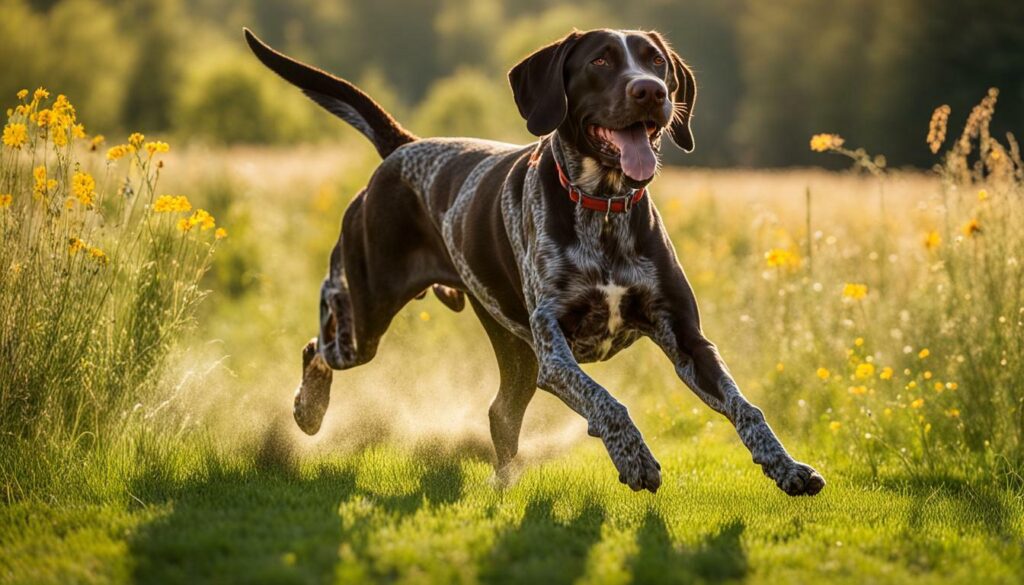
Remember to always consult with your veterinarian to ensure that your German Shorthaired Pointer is healthy enough for physical activity. They can also provide guidance on exercise routines based on your dog’s specific needs. With plenty of exercise and physical activity, your GSP can remain healthy, happy, and in optimal condition for years to come.
Feeding Your German Shorthaired Pointer
Feeding your German Shorthaired Pointer a well-balanced and nutritious diet is crucial for their overall health and well-being. Proper nutrition will help your GSP maintain a healthy weight, provide them with energy, and strengthen their immune system.
When choosing the right food for your GSP, it’s important to consider their age, size, and activity level. Puppies and adult dogs have different nutritional needs, and larger dogs may require different food than smaller dogs.
Look for high-quality dog food that contains a balance of protein, fat, and carbohydrates. Avoid food that contains excessive amounts of fillers, such as corn or wheat, as they provide little nutritional value for your GSP.
It’s also crucial to portion control your GSP’s food to prevent obesity. Overfeeding can lead to health problems such as joint pain, heart disease, and diabetes. Consult your vet to determine the appropriate amount of food for your GSP’s age, weight, and activity level.
If your GSP has specific dietary needs, such as allergies or digestive issues, consider consulting your vet for recommendations on specialized diets or supplements.
In addition to a well-balanced diet, access to clean, fresh water is essential for your GSP’s health and hydration.

By providing your German Shorthaired Pointer with a high-quality, balanced diet and monitoring their portion control and hydration, you can help ensure that they live a healthy and happy life.
Grooming Tips for German Shorthaired Pointers
German Shorthaired Pointers have a short, low-maintenance coat that requires minimal grooming. However, regular grooming is still essential to keep them clean and healthy. Here are a few tips for grooming your GSP:
- Brush your GSP’s coat at least once a week to remove loose hair and prevent matting. Use a brush that is appropriate for their coat type.
- Bathe your GSP as needed, but not too frequently, as it can dry out their skin. Use a dog-specific shampoo and conditioner.
- Clean your GSP’s ears regularly to prevent infections. Use a damp cloth or cotton ball to wipe away any buildup.
- Trim your GSP’s nails every few weeks to prevent them from becoming too long and causing discomfort. Use a clipper specifically designed for dogs.
- Brush your GSP’s teeth daily to prevent dental issues. Use a toothbrush and toothpaste designed for dogs.
It’s also important to keep an eye out for any signs of skin irritations, hot spots, or other issues that may require veterinary attention. Regular grooming sessions provide an opportunity to check for any unusual lumps or bumps on your GSP’s skin.
Remember, grooming your German Shorthaired Pointer not only keeps them looking great but also helps to maintain their overall health and well-being.

German Shorthaired Pointers are wonderful companions, but like all breeds, they can present certain challenges to their owners. Here are some of the most common problems that GSP owners face, along with some solutions and guidance for addressing them.
Separation Anxiety
One of the most common issues that GSP owners face is separation anxiety. These dogs are fiercely loyal and bond closely with their owners, which can lead to anxiety and stress when left alone. This can result in destructive behavior, including chewing, digging, and barking.
To help your GSP overcome separation anxiety, it’s important to establish a routine and create a safe and comfortable environment. Gradually increase the amount of time your dog spends alone and provide plenty of toys and distractions to keep them occupied. Consider using positive reinforcement training techniques to reinforce good behavior and help reduce anxiety.
Boredom and Destructive Behavior
German Shorthaired Pointers are energetic and intelligent dogs that require plenty of physical and mental stimulation. Without adequate exercise and mental stimulation, they can become bored and exhibit destructive behavior.
To prevent boredom and destructive behavior, it’s important to provide plenty of exercise and activities that challenge your GSP’s mind. Consider activities such as agility training, hiking, and interactive toys that require problem-solving skills. Regular exercise and playtime will help keep your GSP healthy and happy.
Aggression towards Other Dogs
Some German Shorthaired Pointers can exhibit aggression towards other dogs, especially when they feel threatened or intimidated. This can create stressful and potentially dangerous situations for both your dog and others.
To address aggression towards other dogs, consider working with a professional trainer to help your GSP learn to socialize and interact appropriately with other dogs. Gradually introduce your dog to other dogs in a controlled environment, and always supervise interactions to prevent any aggressive behavior.
Excessive Barking
German Shorthaired Pointers are vocal dogs that may bark excessively if not trained properly. Excessive barking can be a nuisance to neighbors and can also indicate underlying anxiety or stress.
To address excessive barking, consider using positive reinforcement training techniques to teach your GSP when it is appropriate to bark and when it is not. Provide plenty of exercise and mental stimulation to help reduce stress and anxiety, and consider using calming aids such as pheromone diffusers or calming supplements.
Escape Artist
German Shorthaired Pointers are athletic dogs that enjoy exploring their surroundings. This can lead to escape attempts, as they may try to dig under fences or jump over them.
To prevent escape attempts, ensure your yard is secure and free from potential escape routes. Consider using a high-quality fence and reinforcing it with concrete or other materials to prevent digging. Additionally, provide plenty of exercise and mental stimulation to help reduce the urge to escape.
By addressing these common challenges and using positive reinforcement techniques, you can create a safe and harmonious environment for you and your German Shorthaired Pointer.
FAQ
Getting to Know the German Shorthaired Pointer
What are the characteristics of a German Shorthaired Pointer?
Choosing the Right German Shorthaired Pointer Breeder
How do I find a reputable German Shorthaired Pointer breeder?
Bringing Your German Shorthaired Pointer Home
What do I need to do to prepare for bringing a GSP home?
Raising a German Shorthaired Pointer Puppy
What are the essential aspects of caring for a GSP puppy?
Training and Behavior Tips for Your German Shorthaired Pointer
How can I effectively train my GSP and manage their behavior?
Caring for the Health and Wellness of Your German Shorthaired Pointer
What are the important aspects of GSP health care and wellness?
Meeting the Exercise Needs of Your German Shorthaired Pointer
How much exercise does a German Shorthaired Pointer require?
Feeding Your German Shorthaired Pointer
What should I feed my GSP and how much?
Grooming Tips for German Shorthaired Pointers
What are the grooming needs of a German Shorthaired Pointer?
Common Challenges and Solutions for German Shorthaired Pointer Owners
What are some common problems and how can I overcome them as a GSP owner?

Marissa Delotta, 36, from Dayton, Ohio, is the creative force behind Roverboard.com, a beloved online destination for dog lovers. As a dedicated mom and canine enthusiast, Marissa combines her family experiences with her love for dogs to offer a platform where dog owners can exchange tips, heartwarming stories, and advice. Her website has become a vibrant community for sharing the joys of dog parenting. In her free time, Marissa enjoys exploring dog parks with her family and volunteering at local animal shelters.

